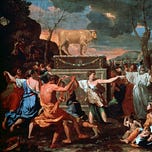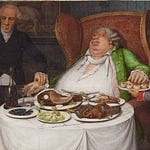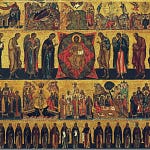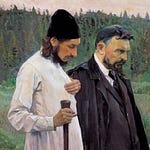Christ is risen!
In existentialism (in the first approximation), there is an idea that of all living beings, man alone realizes his impermanence. This realization creates dissonance and dread, for in the face of surely and speedily approaching death, most tasks with which we fill our limited time are a real waste of life; and since life is but a compilation of such moments, it itself is not particularly worth living. In an effort to compensate for this dissonance, man is drawn to things that have a sense of permanence - art, music, literature, family, and naturally, religion. However, most of these things, and perhaps many religions, do not possess true permanence.
Most art that has ever been created by humans does not survive. The few broken statues, faded paintings, or buried brooches that we find are only a small fraction of what once existed; and an age of a few hundred years or even a few thousand is hardly an eternity. Of course, there are cave painting that are twenty, thirty, or perhaps forty thousand years old. In my opinion, many of them are far more artistic than some of the later art and incomparably so when viewed against the so-called “modern art,” but even a hundred thousand years is not an eternity, not permanence.
The same can be said about music. Relatively few people listen to classical music, fewer still to that of antiquity, and no one listens to anything composed by the Cro-Magnons or the Neanderthals who apparently enjoyed playing flutes made of bone fifty or sixty thousand years ago. Perhaps, it is reasonable to assume that most modern compositions are not likely to survive the test of time. It is a rare parent who wishes for his children to grow up to be fans of Justin Bieber or Britney Spears, and I suspect that most of our grandchildren will not be Swifties.
Cicero is often misquoted as lamenting that “everyone is writing a book.” He did not actually say that, although Horace did say something to that effect: “Scribimus indocti doctique poemata passim” (Ars Poetica, 19 BC - only a few decades after the death of Cicero). Much of present-day English-language poetry has arguably deteriorated into purposefully-clumsy and awkward prose - at least, compared to Byron or even Blake; but in the context of Horace’s sentiment, the lack of poetic skill and talent is hardly new or noteworthy. Perhaps even more common is the desire to write a novel; and many do; and few of them will ever be read, even fewer appreciated, and hardly any will stand the test of time. Even the most talented works perish in fires - like those set by Julius Caesar in Alexandria (48 BC), by Christians in Ephesus (55 AD), by Emperor Constantine in Nicaea (325), by the French in Paris (1242), by the Mongols in Baghdad (1258), by the Nazis in Belgrade and Warsaw (1941 and 1944), by Stalin in Birobidzhan (1950s), by the school board in Drake, North Dakota (1973), by Orthodox Jews in Jerusalem (1980 and again in 2008), by the Georgians in Abkhazia (1992), by looters in Baghdad (2003), by Catholic seminarians in Boone, North Carolina (2017), by a Catholic school board in Ontario (2019), and many, many others - too many to name them all, but the fires destroying books have been burning for millennia, and continue to burn, and there is no sign that Fahrenheit 451 can be avoided.
Listen to this episode with a 7-day free trial
Subscribe to Phroneo to listen to this post and get 7 days of free access to the full post archives.












